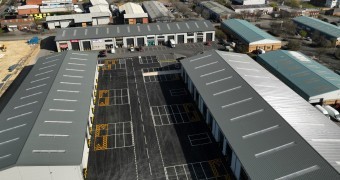How to reduce safety risks
Whether you’re a landlord or a tenant, Health & Safety awareness within a commercial property environment is essential. There are several essential rules to be aware of when responsible for operations in a commercial property in order to be compliant and reduce areas of risk.
What is the Health and Safety Executive?
The Health and Safety Executive (HSE) is a national public body which serves as a regulator for workplace Health and Safety. The purpose of these regulations are to protect workers and prevent death, injury and ill health.
In the last year, 144 people were fatally injured at work mostly due to falling from heights, being struck by vehicles or being hit by moving objects. Many more suffered non-fatal injuries such as falls, slips and trips. Health and Safety legislation is designed to protect against such accidents and minimise their occurrence.
Strict penalties are imposed on those who allow, through negligence, accidents to occur – the most severe of which can result in two years imprisonment and an unlimited fine, under the Health and Safety (Offences) Act 2008. It’s in everyone’s best interest, therefore, to comply with the rules.
Commercial property solutions
Our team of building consultants provide a range of commercial property solutions, from specialist building surveys to architecture and education funding application support. Speak to one of our experts to find out how we can help you deliver your objectives.
Understanding Fire Safety for Landlords
If the lease stipulates you as being responsible for safety on your commercial premises, it will fall to you to implement a health and safety risk assessment to determine possible fire risks within the building. The HSE has guidance on how this can be approached on its website.
If responsible for a building as a landlord, the HSE states that you should take the below actions to be compliant for fire safety:
- Ensure at least one smoke alarm is installed on every storey of the building.
- Make sure the fire escape routes are clearly accessible.
- Fit a carbon monoxide detector in each room which has a solid fuel-burning appliance.
- Check that all furniture and furnishings meet safety guidelines and are fire-resistant.
- Complete fire risk assessments and reviews on a regular basis every two years.
What should Tenants know about Fire Safety?
Most leases will state that fire safety is your responsibility – check through the details carefully before you sign it. If it is, you must carry out a fire risk assessment in order to protect yourself and those people working for you.
Landlords are responsible for providing smoke alarms though you will need to ensure that they continue to work after the initial test is conducted. You should also complete the following to address fire safety as a tenant:
- Test your smoke alarms on a monthly basis
- Check if any of your smoke alarms have one-year batteries and if so, make sure these are changed every year
- Only remove smoke alarm batteries when they need to be replaced
What are a landlord's responsibilities regarding asbestos in buildings?
Once a popular fire-retardant material, asbestos is now regarded as a major risk to health, causing lung diseases which are often untreatable. If your building dates from before the mid-80s there is a possibility that it may contain asbestos. A survey can be conducted to clarify if your building does contain asbestos. Again, the lease you draw up will state who has responsibility for maintaining a building which contains asbestos, but if it is found on the premises, a thorough risk assessment will be necessary. Strict penalties for not managing its risk can be incurred.
As a landlord of a rental property, you have the responsibility to complete the below:
- Check for asbestos in the stairways, entrance halls, communal garden, rooftop spaces, and garages.
- You are legally required to assess all communal parts of the property and prevent exposure risk to hazardous materials such as asbestos.
What should tenants be aware of if they are concerned about asbestos in their property?
If you suspect that the premises you are renting contains asbestos you must check your lease to see if you are responsible for maintenance and repair. If it is unclear, the law will state that the party with the ‘greatest degree of control’ over the building has a legal duty to establish the presence of asbestos in order for a risk assessment or remedial work to be undertaken.
If, as a tenant, you suspect there may be asbestos in your property, you should complete the below actions:
- Contact the environmental health department from your local authority to receive their advice.
- Inform your landlord about your concerns of asbestos in your property.
Your local authority will complete an investigation to check that the occupiers of the property are not under risk, and if so, will take necessary actions to remove the asbestos as a dangerous substance.
Understanding Electrical Health & Safety for Landlords
Unless you are supplying electrical equipment to tenants, your main responsibility as a landlord of a commercial property will be to ensure that the wiring in your premises is safe and fit for purpose. This will mean having a certified safety check undertaken before the premises are let.
Electrical Health & Safety for Tenants
As a tenant, you must undertake a risk assessment of the equipment you intend to use on your rented premises and ensure that none of the equipment is faulty or is likely to cause harm. Check that your lease explicitly outlines your landlord’s responsibility for the maintenance of the wiring, and that they can provide a safety certificate for the building.
What are Landlords’ responsibilities for Gas Health & Safety?
If you supply any gas appliances to your tenants, such as water heaters, it is your responsibility to ensure that they have certified annual checks to guarantee their safety. Otherwise you must ensure that- if your building has common areas- the heating equipment there is well maintained.
Understanding Gas Health & Safety for Tenants
Generally it is your responsibility to ensure the safety of gas appliances in commercial buildings that you occupy. This includes appliances, pipe work and flues. Your lease should set out your exact responsibilities so it’s important that you understand what these entail.
How to be health and safety compliant
Landlords and tenants alike must be absolutely clear what their responsibilities are for the health and safety of anyone who occupies a commercial property. To prevent injury or death and to avoid a large fine or possible imprisonment, leases should clearly outline who is accountable for each aspect of H&S. If you need help drawing up a lease or interpreting its clauses, or if you need guidance on any aspect of Health and Safety, contact a member of our team.
The Royal Institution of Chartered Surveyors is a UK-based professional body for surveyors designed to effect positive change in the built and natural environments. Our team of chartered surveyors are RICS qualified and have the expertise to provide a range of services across commercial property. Contact one of our team today to see how we can help you from our network of offices across the UK.
Experts in commercial property
Contact our team of leading auctioneers, property agents, and RICS-qualified surveyors today.












